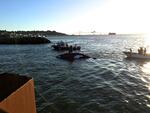
Boats guide a fiberglass orca into the Port of Astoria's East Mooring Basin.
Brad Blaser
The Port of Astoria attempted to scare hundreds of sea lions off its docks Thursday using a motorized orca made of fiberglass. But after a series of mishaps, the experiment went belly up.
Port leaders had high hopes for the fake orca as it pulled into town on a trailer from Bellingham, Washington. A fake baby orca tagged along, lashed onto the roof of an SUV.
It was designed to look like a killer whale but run like a boat, with a motor and a hole on top for a pilot to look out and steer. Everyone was hoping the sea lions would see it as a predator and swim away from the port docks, where they've caused major headaches.
But that's not how things went. John Andersen of Bend watched as the whale eventually had to be towed back to the docks after multiple failures.
"I have seen its motor die. I've seen the tow rope snap. I've seen the pilot bail out," he said. "I have seen what looks to me so far to be a major fiasco."
The effort drew little if any reaction from the barking sea lions, but Port of Astoria Executive Director Jim Knight said he doesn't see it as a total failure.
"Actually I feel really good because our expectations were pretty low," he said. "We had no idea whether it would work. What we were really successful at was bringing attention to the problems we have here in Astoria with our friendly, noisy critters that have come to visit us. So, in that sense I'm really glad to have this opportunity and have the rest of the world know what we're faced with."
A record of more than 2,000 sea lions piled into the port's East Mooring Basin this spring. The 800-pound animals have damaged the docks' infrastructure and even sunk boats that tried to moor there.
The port has tried flagging, electrified pads and even beach balls to scare them off, but to no avail. Knight said he'd like to see what a real orca could do – or at least one that worked better then the one they launched on Thursday. But he suspects whatever effect an orca would have would be temporary.
"They'd probably come back anyway," he said. "So, we've got to find much, much better measures than bringing in imitation orcas. I'm back to trying to find another way to keep them off the docks."
